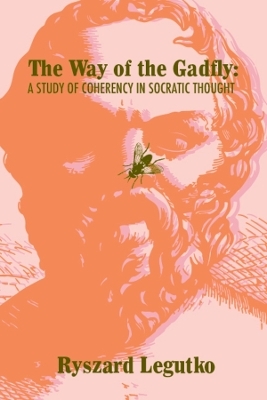
The Way of the Gadfly
St Augustine's Press (Verlag)
978-1-58731-593-0 (ISBN)
- Noch nicht erschienen (ca. Dezember 2024)
- Versandkostenfrei innerhalb Deutschlands
- Auch auf Rechnung
- Verfügbarkeit in der Filiale vor Ort prüfen
- Artikel merken
Legutko argues that Socrates was systematic, and his moral views were ultimately grounded in his theory of knowledge that was composed of logically connected propositions (logoi). Reading Plato, Legutko's intuition that Socrates was quite the opposite of the quirky, ironic, and enigmatic character is supported by his demonstration of Socrates' consistency, unity, and hierarchy of thought. He extends Socrates' coherency to a criticism of the democratic mind, framing him even less as a random spit-fire and more the grounded observer. Socrates, argues Letgutko, is well aware of the importance of general concepts and he intended to free these concepts from democratic distortions and give them firm and independent foundations.
In short, 'the way of the gadfly' is a beautiful and precise exploration of order that seeks to be changed by the awareness of this order, and how to wield concepts apart from the motives of arrogance and chaos––neither of which represent nature, and therefore are foreign to the way of the gadfly.
Ryszard Legutko, a Polish philosopher, taught ancient philosophy and political theory at the Jagiellonian University in Kraków, Poland. He has also been a politician – a former Minister of Education, Deputy Speaker of the Senate, and Secretary of State in the Chancellery of the President of Poland. He is Chairman of the European Conservatives and Reformists Group in the European Parliament. He published many books in Polish, the most recent being The Presocratic Philosophy: From Thales to Democritus (2020). He translated four of Plato’s dialogues into Polish: Apology, Euthyphro, Phaedo, and Crito. He is working on the translation of Plato’s Republic. Among the books published in English are The Demon in Democracy (Encounter Books 2016) and The Cunning of Freedom (Encounter Books 2021). The Demon of Democracy, which explores the problem of totalitarian tendencies in modern liberal democracy, was widely reviewed and translated into several languages, including French, Spanish, and German.
INTRODUCTION
CHAPTER I – KNOWLEDGE
1. In search of knowledge
1.1 Socrates’ criteria of knowledge (SCK)
1.2 Knowledge of knowledge
2. Definitions
3. Elenchus
4. True opinion
5. Midwifery, anamnesis, activation
5.1 Midwifery and intellectual activation
5.2 Anamnesis
6. Ignorance and knowledge
6.1 What Socrates did not know
6.2 What Socrates knew
6.3 Socrates’ basic theses (SBT)
CHAPTER II – VIRTUE AND THE SOCRATIC MAN
1. Background
2. The unity of virtues
2.1 Popular definitions
2.2 Parts-of-face definitions
2.3 Parts-of-gold definitions
2.4 The eidos incarnate
3. The hedonistic argument
3.1 The hedonistic argument: Parts one and two
3.2 The hedonistic argument: Part three
3.3 The hedonistic argument part four and the problem of courage
3.3.1 Courage, confidence, technē
3.3.2 Fear of injustice and fear of disgrace
4. The argument from human nature
4.1 Socrates’ first thesis: the tyrant does not do what he wishes
4.2 Polus’ responses
4.3 Socrates’ second thesis: The greatest evil is adikein
4.4 Socrates’ third thesis: adikein is worse than adikeisthai
4.5 Socrates’ fourth thesis: injustice is a disease of the soul
CHAPTER III – POLITICS
1. Socrates, the craft of politics, and the democratic man
2. Avoidance of politics
3. True politics
3.1 True politics and political order
3.2 True politics and knowledge
3.3 The just polis
4. Good laws
5. Parental state and tacit consent.
5.1 Crito’s offer and Socrates’ reply
5.2 The Laws of Athens speak
5.2.1 The fourth logos
5.2.2 The state as parents
5.2.3 Tacit consent
5.2.4 Persuading the state
5.2.5 The Laws’ concluding remarks and Socrates’ final words
CHAPTER IV – PHILOSOPHER IN ACTION
1. Philosopher and the city
2. Irony
2.1 Self-deprecation
2.2 Not speaking seriously
2.3 Serious playfulness
3. The educational value of the elenchus
4. Socrates’ mission
5. Mission, the god and elenchus
5.1 Wisdom and ignorance
5.2 Virtue and goodness
5.3 Gadfly
6. Socrates’ charm
6.1 Enchanting
6.2 Benumbing
| Erscheinungsdatum | 26.08.2024 |
|---|---|
| Verlagsort | Indiana |
| Sprache | englisch |
| Maße | 152 x 229 mm |
| Gewicht | 399 g |
| Themenwelt | Geisteswissenschaften ► Philosophie ► Philosophie Altertum / Antike |
| ISBN-10 | 1-58731-593-9 / 1587315939 |
| ISBN-13 | 978-1-58731-593-0 / 9781587315930 |
| Zustand | Neuware |
| Haben Sie eine Frage zum Produkt? |
aus dem Bereich


